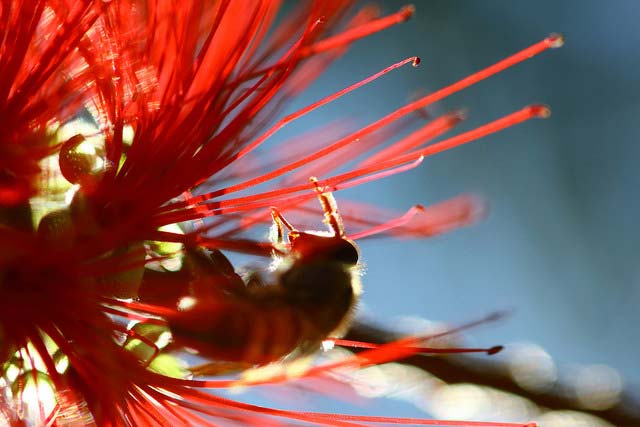Apply grub control the right way to protect honeybees

When do you normally apply grub control to your lawn? Do you do so during early spring or early summer? This is a serious mistake that can not only negatively affect your turf but honeybees too.
Honeybees pollinate about 80 percent of America’s flowering crops, and help plants cross-pollinate and survive. In turn, we take advantage of honeybee pollination in a number of ways. Honey contains powerful antibacterial properties due to a bee-produced protein called defensin-1 and glucose oxidase.
Yet, each year, people apply grub control, such as imidacloprid, to their turf too early in the year. This disrupts the insects’ ability to navigate back to their hives, noted Dave Smitley of Michigan State University Extension, Department of Entomology, and pollinate properly. In turn, this can devastate not only bees but people and animals as well.
Just last year the U.S. Department of Agriculture published an annual report containing responses of over 5,700 beekeepers in the U.S. that managed nearly 390,000 honeybee colonies in October 2015. Between April 2015 and March 2016, keepers lost 44 percent of those colonies. This type of loss–typically called the “colony collapse disorder–is happening at a much higher rate than in the past. Other pesticides, such as those used to kill the Zika virus, recently killed millions of honeybees in South Carolina, reported the New York Times.
This type of honeybee loss is simply unsustainable, and without proper pesticide management (especially from professionals), we may one day see the complete extinction of the honeybee population. As you can imagine, the effects would be calamitous. According to Life Noggin, approximately every third bite of food we eat is a direct result of honeybee activity. Without these helpful insects, much of this food likely disappears.
Apply grub control (and pesticides) correctly and in moderation
The issue isn’t always imidacloprid, which is actually considered rather safe to use on lawns. The grub control is only moderately toxic if mammals consume a copious amount of material, and it’s actually considered non-irritating or damaging to their eyes and skin. Furthermore, if consumed, imidacloprid is almost immediately removed from the gastrointestinal tract by way of urine and feces.
The problem is: People often apply imidacloprid to their properties too early in the year. Many (including professionals) apply grub prevention in the spring and early June when honeybees actively collect pollen from blooming flowers, such as low-lying clover.
Instead, apply imidacloprid or other grub controls in mid to late summer when plants are dormant and not actively growing or blooming.
To minimize potential damaging effects of imidacloprid, GreenAce Lawn Care follows these strict protocols:
- Create buffers: Spreader guards ensure imidacloprid doesn’t get into gardens or flower beds. Create a border around all waterways by keeping our distance.
- Wait until mid-summer: Distribute imidacloprid in mid to late summer for two reasons: 1) Grubs don’t become active until this time of year anyway, and 2) We can typically apply imidacloprid up until late July (or sometimes August) depending on the weather and temperature.
- Use granular imidacloprid: Granular imidacloprid reduces the chance honeybees come into contact with the pesticide. It’s also less likely to leach into flower beds, gardens, or waterways.
- Don’t make excuses: Don’t let a lawn care professional tell you they protect honeybees by applying less grub control. “Even at very low levels, pesticides can weaken bees’ defense systems, allowing parasites or viruses to kill the colony,” said Tomasz Kiljanke, lead author of a study that found 57out 200 pesticides in contaminated honeybees. By applying the right amount of imidacloprid – at the right time of year – you can avoid having to apply a grub control such as Arena or Dylox, which is much stronger than preventive pesticides.
Without honeybees, much of the world we know would come to a standstill. That’s why it’s critical we apply grub control at the right time of year
We service many towns in Norfolk County, Mass. including Foxborough, Mansfield, Sharon, Walpole, Norwood, Westwood, Norfolk, Medway, Millis, Medfield, Dover, Sherborn, and surrounding towns. For more information, contact us today.
Your trusted lawn care provider and lawn pest exterminator
We Service Areas of Norfolk and Bristol County, Massachusetts Including, Foxborough, Mansfield, Wrentham, Walpole, Plainville, Franklin, Norfolk, Sharon, North Attleborough, and Parts of Attleboro, Stoughton, Canton, Norwood, Norton and Medfield. Learn more about our Complete Lawn Care program.
